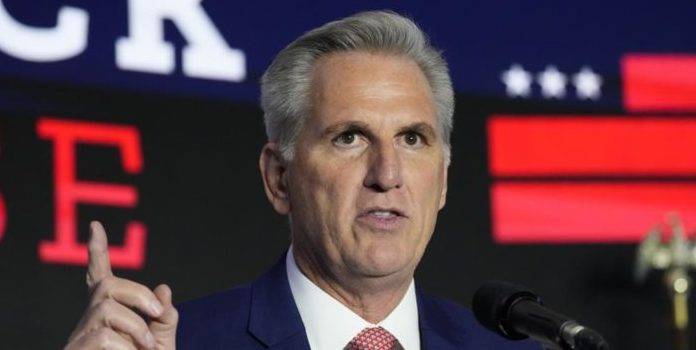(Mark Pellin, Headline USA) A massive cryptocurrency money-laundering scheme allegedly involving the collapsed financial firm FTX not only funneled tens of millions of dollars into the coffers of Democrat campaigns, the reputed illicit funds were also used by House Minority Leader Kevin McCarthy, R-Calif., to boost midterm candidates sure to back his bid to become House Speaker.
McCarthy has recently drawn heated criticism and damning headlines for redirecting money from midterm races where solidly conservative candidates in Arizona and Nevada were surging and in need of financial support, to instead help Lisa Murkowski notch a win over Trump-endorsed Kelly Tshibaka in Alaska.
But there were also dozens of lower-profile, equally critical races across the country where machinations to disperse Republican House Leadership funds, directed by McCarthy, deployed FTX money to campaign against MAGA candidates in Republican primaries, ensuring their establishment opponents likely paths to the U.S. House with general election wins.
“This was orchestrated so McCarthy could be the next speaker of the House. He needed to do it. He’s still struggling to get the votes,” Idaho pro-liberty Republican Bryan Smith told Headline USA.
Smith lost a contentious GOP primary to multi-term liberal incumbent and McCarthy ally Rep. Michael Simpson, who received an influx of more than $700,000 at the direction of House leadership from the American Federal Dream Action PAC.
That particular PAC was “funded exclusively by $15MM from Bitcoin exchange FTX Co-CEO Ryan Salame,” according to a report from the American Accountability Foundation.
“Reliable sources report the instruction to support the PAC came at the direction of leadership,” AAF wrote in a Nov. 14 letter, and noted that “AFDA only made expenditures in support of the following candidates in their primary elections.”
Simpson received that primary support because, “McCarthy knew that he would carry his water, and that I’d represent my constituents,” Smith said.
“He knew he wouldn’t get my vote [for speaker],” he said of McCarthy. “I defeat a guy like [Simpson] in the primary, and he figures it’s one less vote he’d get for speaker, so of course he’s coming after me.”
Another swamp hit took out popular MAGA Republican Anthony Sabatini in Florida’s GOP primary, where he lost to Cory Mills, a conservative who has endorsed McCarthy for speaker. Mills advanced to beat Democrat Karen Green, flipping Florida’s 7th Congressional District to red.
In the weeks running up to the primary, the McCarthy-directed American Liberty Action PAC dumped nearly $1.6 million into ad buys that targeted Sabatini, who made clear he wouldn’t support a McCarthy bid for speaker, and promoted Mills.
“Kevin McCarthy is incredibly corrupt and would do whatever it takes to advance his own interests,” Sabatini told Headline USA. “He’s more concerned about keeping his establishment cronies in place than in winning elections for America First candidates who wouldn’t back him for speaker.”
Smith shared that sentiment.
“If it was versus just the Democrats, we win the fight to hold Biden accountable,” Smith said. “But it’s also a fight against the entrenched establishment crowd. When your own guys are with the other team, it’s like showing up for a baseball game and you find out the umpire is playing for the opposition. It makes it all the harder.”
The money being funneled from a source linked to the FTX scandal made it even more of a gut punch.
“He was using money mixed up with an organized crime syndicate, to help enable him to become speaker,” Smith said of the FTX funding reportedly dispersed under McCarthy’s direction. “It’s disgraceful.”
Smith and Sabatini weren’t alone in McCarthy’s targeting campaign, according to the AAF’s analysis of spending by Republican House Leadership in the 2022 midterm cycle.
With more than $365 million from 14 separate PACS at McCarthy’s disposal to direct to candidates, ones ranked as solid conservatives received barely 21% of campaign funding, while “liberal/establishment candidates” received close to 35%, according to the AAF analysis. The remaining funds were distributed to candidates who weren’t “an obvious fit in either of those categories.”
McCarthy directed $76,671,587 of funding to conservative members of and candidates for the Republican Conference and $126,435,136 to liberal/establishment runners.
“The ideological breakout of the candidates provides an important insight into the leadership direction of Congressman McCarthy should he be elected Speaker,” the AAF wrote of McCarthy’s funding priorities.
Smith gained first-hand insight during the race for Idaho’s 2nd District Congressional seat, when a poll that showed him gaining traction on Simpson came out five days before the primary. Within a week, the Simpson campaign had launched nearly a half-million dollars worth of ad buys, Smith said. In Idaho’s relatively small media market, that translates into loads of loot, comparable to $4 to $5 million in larger markets, he said.
“It just shows you that, even in Idaho, we’re not immune from the influences of gangsters, mobsters, and McCarthy,” Smith said. “This is what happens when you become fully dipped in the swamp.”

